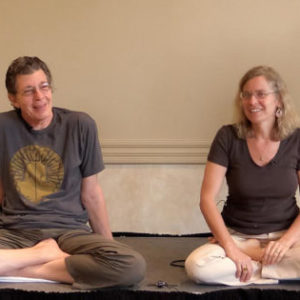When can I begin the course?
Anytime. This is a stand-alone, self-paced course. Start, stop, begin again, any time that is convenient for you.
How long will it take me to complete the course & how long will I have access to it?
Total actual hours: 9.4; Total University hours: 11.3; Total NAMA (TIA) PACE hours: 10
There are approximately 9 hours of material on the 9 recordings. However, it may take longer to complete the course. We recommend you take your time with the material, reviewing sections that are either particularly meaningful for you or that are unclear with one listening.
You will have access to the course for one year from the time you register. You can extend access to it for another year for 50% off the original price, or 50$ per extra month of access.
Please see, “Course Structure” above, for the length of the individual lessons.
What if I have questions on course content? Will I have live access to Drs. Welch & Svoboda?
If you have questions about course content as you go along and would like support, there are a couple options:
- Q&A: We plan to offer two live Q&A calls per year with Drs. Welch and Svoboda, exclusively for alumni of our online courses co-taught by both doctors: “Foundations of Ayurveda Part I“, “Part II”, “The Planets” and, “Pratyāhāra: Turning Awareness Within, and post them on our Q&A page.Once you are a registered student of one of these courses, you will receive emails letting you know when live calls are scheduled, how to join them, and be invited to submit questions on course content. If you are not an alumnus of any of those courses, you are still welcome to listen to or share these sessions, but you may find them a bit confusing, as they relate to material covered in those courses.
- Tutoring: you can sign up for a tutoring option with one of our tutors.
What if I need technical support?
Once you are a registered student, we let you know who to contact if you need technical support with the website or course.
Can I download the lessons?
No. This is a streamable course only.
Are there any required textbooks?
No.
Is there a quiz?
Yes, there is a quiz at the end of the course. They are not tricky questions. In fact, they are decidedly un-tricky. All quiz questions cover the stated objectives listed for each section. All passing grades are 80%.
Can I have a certificate of completion?
Yes. Once you have successfully completed the course and quiz, you will have the option to print out a certificate that will include your name, the name of this course and the number of course hours. Please download, save and print out your certificate before your access to the course expires. Even if you don’t want it now, you might want it later. If you don’t download your certificate before your access to the course expires, you can request it in the future but we may no longer have access to it and, even if we do, it takes some fiddling and time to get one for and to you, so there will be a $50 administration fee for this service.
Where can I find answers to questions about the legality of practicing Ayurveda, about certification, or NAMA issues?
This course is worth 10 NAMA (TIA) hours. These hours are listed on your certificate of completion.
For information on NAMA, legal requirements and our courses, kindly see https://drclaudiawelch.com/resources/ayurvedic-certification-licensure/
Does this course fulfill the requirements for CEUs for licensed health care practitioners that are not Ayurvedic professionals?
At this time we are not pre-approved CEU providers for health care professions other than the field of Āyurveda. However, you will have your certificate of completion, which will provide the title of the course, your name, and course hours. This may or may not be sufficient for the organization requiring your CEUs. We encourage you to contact your organization to determine what we could do to support you getting CEU credits for Dr. Welch’s programs. If there is additional documentation that you need, we’d be happy to support you with this for a nominal fee. What that nominal fee would be, depends on the documentation you would need. Please contact our office if you have any questions about this.
What is your refund policy?
We do not offer refunds for online courses. We have tried to provide clear descriptions of our courses; please review this information before purchasing.
Is there an option for financing?
US residents can use the PayPal finance option to pay, when purchasing the course. The PayPal finance option has 0 payments and 0 interest if you pay within 6 months (subject to PayPal credit approval). Beyond 6 months, there would be a 19.99 % interest rate. To choose this option, when you go through the checkout line you will reach the PayPal page where you can choose to pay via your own credit card, via your PayPal account, or via PayPal Credit. Choose PayPal credit. If you haven’t done this before, PayPal will ask some questions to check your credit before approving. Once approved, your transaction will go through and you will have access to the course without needing to pay anything for 6 months. However, to get the zero-interest rate, please remember to pay what you can at the end of the 6 months.


 Foundations of Āyurveda Part II - Complete Course
Foundations of Āyurveda Part II - Complete Course



Claudia Welch –
Nobody seems to ever uses this review feature, but people do let us know how they’ve liked the course and we put some of that, when we remember, in the, “Is This The Right Course for Me” menu tab above.